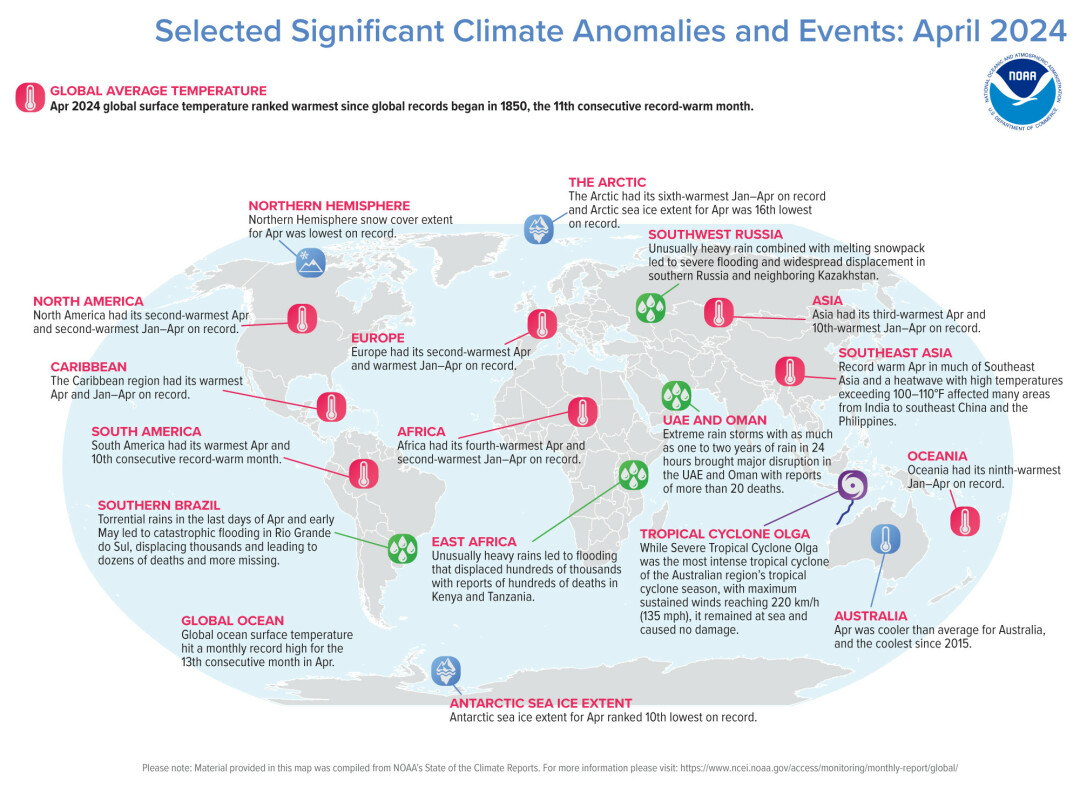News & Articles
Browse all content by date.
 Map from National Centers for Environmental Information.
Map from National Centers for Environmental Information.
In the novel The Ministry For The Future, Kim Stanley Robinson begins his story with a major heat wave that kills millions of people in India. Following this event, the Paris Agreement signatories hold an emergency meeting. At that meeting, the president of the Paris Agreement organization pronounced, “At long last, we have to take the climate situation seriously, as the reality that overrides everything else. We have to act on what we know.”
This heat wave took place in 2025. Here we are in the sixth month of 2024, and we are seeing and experiencing significant climate events taking place around the world – including a new red alert in northern India where the temperature reached 126 degrees Fahrenheit just several days ago. The India Meteorological Department reported that this new record was more than 48 degrees Fahrenheit higher than expected for this time of year.
Several weeks ago, on Saturday, May 11, the lead article in the StarTribune was “CO2 levels rising faster than ever.” Scott Dance, with the Washington Post, reported that atmospheric levels of planet-warming carbon dioxide were 4.7 parts per million higher in March than they were a year earlier.
And according to a 66-year long series of observations by the National Oceanic Atmospheric Administration, CO2 levels are rising faster than ever. The article also reported that once CO2 is in the atmosphere, it stays there for hundreds of years. The most recent level of 427 ppm is 50% above preindustrial levels and the highest in at least 4.3 million years.
Besides the new CO2 updates, there have been a number of new reports or studies about climate events from around the world in just the past several weeks. There are new records in Florida where Tampa reached 108 degrees Fahrenheit and Miami hit 112 degrees Fahrenheit. Mexico reached 124 and Pakistan rose above 125 degrees.
It was also reported that the global migrating freshwater fish population declined 81% between 1970 and 2020. Howler monkeys are dying along Mexico's Gulf Coast. And West Antarctica's Thwaites Glacier is more vulnerable to melting.
In his book The Weight Of Nature: How a Changing Climate Changes Our Brains, Clayton Page Aldern writes about how changes in our environment – including heat, carbon dioxide and air pollution – are impacting our physical and mental health. Aldern presents various studies which highlight these changes impacting students’ cognitive skills, decisions by immigration judges, baseball empires’ error rates as well as how these environmental changes have contributed to being more aggressive, impulsive and violent.
Now that we know about climate change and are beginning to recognize how impactful these climate events are to such things as the environment as well as our mental and physical health, what does Duluth choose to do?
Like the president of the Paris Agreement gathering who stated that we have to take this climate situation seriously because it overrides everything else in our lives, the leaders and citizens of Duluth need to realize that this climate emergency will impact everything in our city. So, will Duluth act on what it knows?
Duane Elgin, in his book Choosing Earth, proposed that we view climate change and our future “through the lens of our level of collective maturity.” He argued that we have the choice to grow up and take a more mature approach to addressing climate change.
Elgin talks about making conscious choices like stopping the rebellion against nature and start designing ourselves back into nature as well as going from the “reckless consumption of resources to a conscious stewardship of the Earth.”
How does our city take a more mature approach to addressing climate change? How does our city make more conscious choices in adapting and responding to current and future climate events? Too often, our political and business leaders appear to be making the conscious choice of denying the reality of climate change or at least choosing to refrain from talking about or even acknowledging these climate events. You only have to look at the governor of Florida who just signed a bill that removes climate change references from state law.
What will Duluth choose to do? Will we choose to address the growing numbers of young people experiencing climate anxiety and depression? Will we choose to prioritize the immediate needs of our vulnerable populations who will be severely impacted by climate change? Will we choose to have an open conversation about climate migration and Duluth's climate future? Or will we choose to not address any of these issues? S
ome immediate choices our city could embrace would be creating climate cafes and support groups for people experiencing climate anxiety and depression, bringing the 2018 climate vulnerability assessment to social service and community organizations that serve our vulnerable populations, and establishing a climate task force or commission in Duluth.
| Tweet |


